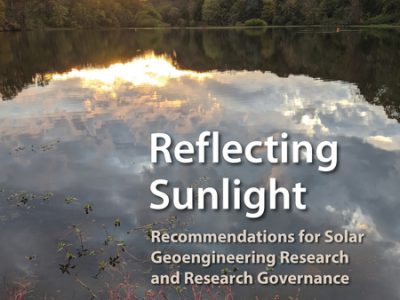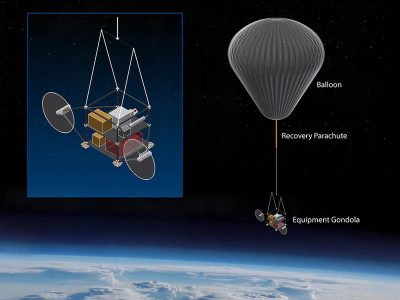Geoengineering
Tightening the Net
Tackling climate procrastination by closing the loopholes in ‘net-zero’ climate goals
The global stampede to adopt net-zero climate goals continues unabated. As a goal net-zero is achieved when any residual carbon emissions are counter-balanced fully by dedicated carbon removal. Delivered at a global level, this would stabilise global temperatures. Almost 70% of states (accounting for 90% of the world’s economic activity) have adopted net-zero goals, as …
Continue reading “Tightening the Net”
CONTINUE READINGA Dangerous Disruption
A startup firm proposes to sell dubious carbon credits from stratospheric aerosol injection
Last week, MIT’s “Technology Review” reported that a small startup firm is proposing to spray reflective aerosols in the stratosphere commercially as a climate corrective. (Stratospheric Aerosol Injection or SAI.) Previously announced online in the Google Geoengineering Group, the firm is small and new, operating with a claimed total of $750K of venture financing. They …
Continue reading “A Dangerous Disruption”
CONTINUE READINGArguments over Solar Geoengineering Research
Science Magazine weighs in
Doing research on environmental issues or responses is usually an easy call for policy-makers and gets wide political support, even if there’s disagreement what to do about the issue. But there is now one big exception: research on solar geoengineering (SG). SG would cool the Earth, temporarily and imperfectly offsetting some of the climate effects …
Continue reading “Arguments over Solar Geoengineering Research”
CONTINUE READINGWhat if someone just does it?
A scenario exercise on unauthorized use of solar geoengineering
Note: This post is co-authored with Jesse L. Reynolds, who recently completed an Emmett Institute Geoengineering Governance Fellowship As the climate crisis grows more urgent, unconventional technological responses are getting increased attention and controversy. We’ve written previously on Legal Planet about these technologies and their promise and risks. The most high-stakes and controversial of these …
Continue reading “What if someone just does it?”
CONTINUE READINGEarth System Interventions for Sustainability
We actively shape major Earth systems, with increasingly powerful technologies. We should face up to it.
Stewart Brand–a contender for the most interesting living person in the world–famously opened the Whole Earth Catalogue in 1969, “We are as gods and might as well get good at it.” Importantly (and often misunderstood), he meant not that we are gods, but instead that technologies have given humanity powers that had previously been exclusive …
Continue reading “Earth System Interventions for Sustainability”
CONTINUE READINGThe US National Academies on Solar Geoengineering Research and Governance
Four Emmett Institute scholars react to an important new report
A few of us are part of the Emmett Institute’s Geoengineering Governance Project, where we study the legal and policy issues presented by solar geoengineering and carbon dioxide removal technologies. On the former set of technologies—that is, reflecting a little incoming sunlight to cool the Earth and temporarily counteract heating from greenhouse gases—the US National …
Continue reading “The US National Academies on Solar Geoengineering Research and Governance”
CONTINUE READINGSolar Geoengineering and Public Engagement Trolling
A first test of a long-planned outdoor solar geoengineering experiment has been delayed–again. Why?
It has been a busy week in solar geoengineering. Last week, the US National Academies released a report that offers recommendations for a research program and for governance of research. (A few of us will post our thoughts on the report here soon.) Here I discuss developments regarding outdoor solar geoengineering experiments, of which there have …
Continue reading “Solar Geoengineering and Public Engagement Trolling”
CONTINUE READINGThe Kolbert Report
Elizabeth Kolbert’s new book asks what it means to protect nature in the Anthropocene.
Elizabeth Kolbert’s new book, Under a White Sky, opens with the story of the battle to keep invasive Asian carp out of the Great Lakes. The problem exists because of two earlier interventions with nature. A century ago, we reversed the flow of the Chicago river to keep the city’s pollutants out of Lake Michigan …
Continue reading “The Kolbert Report”
CONTINUE READINGThe U.S. Government Is Researching Solar Geoengineering. Now What?
Officials should use the tools on hand to get governance right.
In December, Congress renewed funding for the National Oceanic and Atmospheric Administration (NOAA) to investigate stratospheric aerosols as a potential method for “solar climate interventions,” expanding a research program established a year earlier. These actions have been widely interpreted as the first-ever federal research project into solar geoengineering—proposals to slightly “dim the sun” to limit …
Continue reading “The U.S. Government Is Researching Solar Geoengineering. Now What?”
CONTINUE READING“NIABYs” Obstruct Important Climate Change Research
Some activists say “not in my backyard,” but strident opponents of solar geoengineering argue “not in anyone’s backyard.”
A peculiar type of activism is manifesting with regard to solar geoengineering. This proposed set of technologies to reduce climate change has been subject to only a few outdoor experiments. One has been in the pipeline for almost a decade: The Stratospheric Controlled Perturbation Experiment (SCoPEx) would involve the launch of a balloon into the …
Continue reading ““NIABYs” Obstruct Important Climate Change Research”
CONTINUE READING











